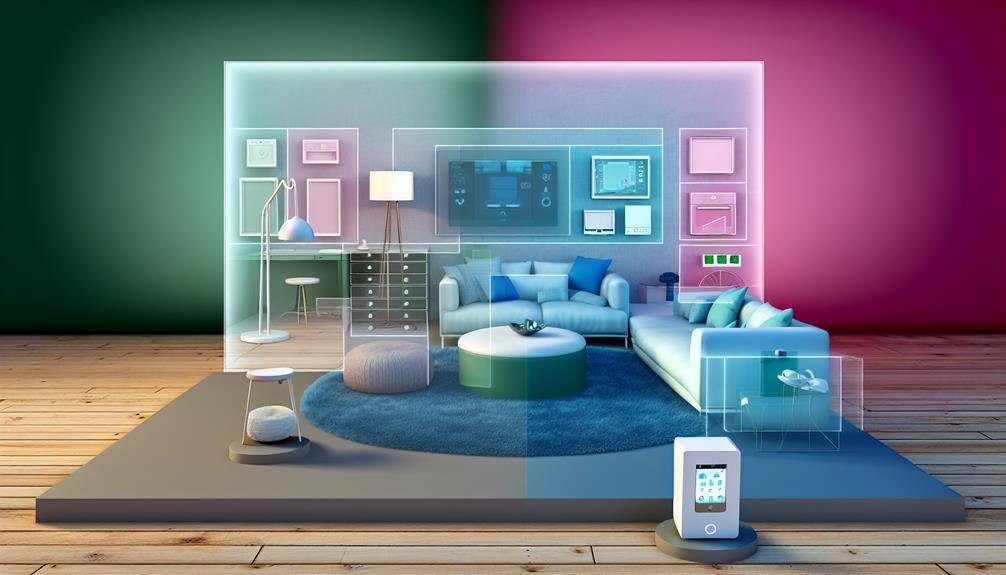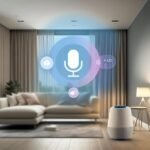As you step into the realm of smart home automation, you find yourself at a crossroads, with a decision to make that will determine the future of your living space. The hub, the heart of this interconnected web, holds the key to a world where convenience and efficiency reign supreme.
But like any path worth exploring, there are pros and cons to consider. So, let's dive into the complexities of smart home automation hubs and uncover the potential benefits and drawbacks that lie within.
Key Takeaways
- Convenience and efficiency: Smart home automation hubs offer convenience and efficiency by allowing centralized control and management of various aspects of the home. This includes energy management, personalized customization options, and eliminating the need for multiple apps or remotes.
- Enhanced security and safety: These hubs provide enhanced security and safety features, such as remote monitoring, instant alerts for potential dangers, and simulated occupancy to deter burglars. This gives homeowners peace of mind and complete control over monitoring and protecting their homes.
- Integration and compatibility: Smart home automation hubs offer seamless integration and compatibility with a wide range of smart devices. They act as a central command center, enabling seamless connectivity and synchronization between different devices. Customizable settings ensure that the smart home functions exactly as desired.
- Cost and investment: While smart home automation hubs may have a significant initial investment, the benefits justify the cost. Remote access saves time and money, regular software updates provide long-term value, and the convenience and energy savings can lead to lower utility bills and reduced carbon footprint.
Convenience and Efficiency
One of the major advantages of smart home automation hubs is the convenience and efficiency they offer in managing and controlling various aspects of your home. These hubs provide you with the ability to monitor and control your energy usage, leading to greater energy management and cost savings. With personalized customization options, you can set schedules and preferences for your devices, optimizing their usage and minimizing wastage.
Smart home automation hubs allow you to integrate and control multiple devices and systems in your home from a single platform. This eliminates the need for multiple apps or remotes, streamlining the management process. By centralizing control, you can easily adjust settings, turn devices on or off, and monitor their status, all from the convenience of your smartphone or tablet.
In terms of energy management, smart home automation hubs provide real-time data and insights on your energy consumption. This helps you identify areas of high usage and make informed decisions to reduce energy wastage. By setting up automated schedules and routines, you can ensure that devices are only active when needed, further optimizing energy efficiency.
Personalized customization options allow you to tailor your smart home automation hub to your specific needs and preferences. You can create personalized scenes and routines that align with your daily routines and lifestyle. For example, you can have your lights dim and temperature adjust when you enter a certain room, creating a welcoming and comfortable environment.
Enhanced Security and Safety
With enhanced security and safety features, smart home automation hubs provide peace of mind by giving you complete control over monitoring and protecting your home. These hubs allow for remote monitoring, which means you can keep an eye on your home even when you're not there. Whether you're at work or on vacation, you can easily access your smart home hub through a mobile app or web portal to check your security cameras, lock or unlock doors, and even receive alerts if there's any unusual activity detected.
In addition to remote monitoring, smart home automation hubs also offer emergency response capabilities. With integrated smoke and carbon monoxide detectors, these hubs can send instant alerts to your smartphone if there's a potential danger in your home. This allows you to take immediate action, whether it's calling emergency services or contacting a neighbor to check on your home.
Furthermore, smart home automation hubs can be programmed to simulate occupancy when you're away, making it appear as though someone is home even when you're not. This can deter potential burglars and provide an added layer of security to your property.
Integration and Compatibility
Smart home automation hubs offer seamless integration and compatibility with a wide range of smart devices, allowing you to create a fully connected and convenient home environment. With these hubs, you can easily manage all your smart devices from a single interface, eliminating the need for multiple apps and control panels.
The table below highlights some popular smart home automation hubs and their compatibility with various devices:
| Automation Hub | Compatible Devices |
|---|---|
| Amazon Echo | Smart speakers, smart lights, smart thermostats, security cameras |
| Google Home | Smart speakers, smart lights, smart thermostats, door locks |
| Samsung SmartThings | Smart lights, smart thermostats, security sensors, door locks |
| Apple HomeKit | Smart lights, smart thermostats, door locks, cameras |
These hubs act as a central command center for all your smart devices, allowing you to control them through voice commands or smartphone apps. They enable seamless connectivity and synchronization between different devices, providing a truly integrated experience.
In addition to offering compatibility with various devices, smart home automation hubs also provide device management capabilities. You can easily add or remove devices, create schedules, and customize settings to suit your preferences. This level of control and flexibility ensures that your smart home functions exactly as you desire, enhancing your freedom and convenience.
Cost and Investment
When considering the cost and investment of smart home automation hubs, it's important to evaluate the financial implications of integrating these devices into your home environment.
While the initial investment may seem significant, there are several factors to consider that can help justify the cost.
Here are three key points to consider:
- Energy Savings: One of the main advantages of smart home automation hubs is their ability to optimize energy usage. By automating lights, thermostats, and other devices, you can ensure that they're only in use when necessary. This can lead to significant energy savings over time, resulting in lower utility bills and a reduced carbon footprint.
- Remote Access: Another benefit of smart home automation hubs is the ability to control your devices remotely. This means that you can adjust the temperature, turn off lights, or even lock your doors from anywhere with an internet connection. This convenience not only adds to the comfort and security of your home, but it can also save you time and money by allowing you to avoid unnecessary trips back home.
- Long-term Value: While the initial cost of smart home automation hubs may be higher than traditional devices, they can provide long-term value. These systems often come with regular software updates and new features, ensuring that your investment stays relevant and up-to-date for years to come.
Considering these factors, the cost and investment of smart home automation hubs can be seen as a worthwhile expense, providing energy savings, remote access, and long-term value.
Potential Privacy and Security Risks
Privacy and security risks can arise when integrating smart home automation hubs into your living space. While these hubs offer convenience and control over various devices in your home, they also come with potential vulnerabilities that could compromise your personal information and safety. It is essential to be aware of these risks and take necessary precautions to protect your privacy and security.
One major concern is the possibility of data breaches. Smart home automation hubs collect and store data about your activities, preferences, and even your daily routine. If this data falls into the wrong hands, it can be used for malicious purposes or sold to third parties without your consent. Additionally, unauthorized access to your smart home hub can result in hackers gaining control over your devices, such as security cameras or door locks, posing a significant threat to your safety and privacy.
To better understand the potential privacy and security risks associated with smart home automation hubs, consider the following table:
| Privacy and Security Risks | Description |
|---|---|
| Data Breaches | Unauthorized access to your personal information stored in the hub's database. |
| Unauthorized Access | Hackers gaining control over your smart home devices and compromising your privacy. |
To mitigate these risks, it is crucial to choose reputable smart home automation hubs that prioritize privacy and security. Regularly updating the hub's firmware, using strong and unique passwords, and enabling two-factor authentication are essential steps to enhance security. Additionally, understanding the data collection practices of the hub and being cautious about granting permissions to third-party apps can help protect your privacy.






